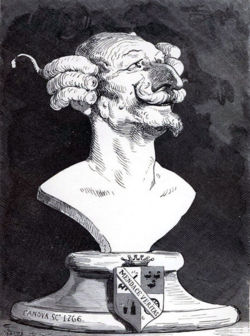Baron Munchausen
(this article is about the fictitious character; for the "real" Baron Münchausen, see Karl Friedrich Hieronymus, Freiherr von Münchhausen).

Baron Münchausen is an enduring figure of comical exaggeration, originated by Rudolf Erich Raspé in a series of stories which were first published in the 1780's. Raspé himself may have borrowed the stories from others; and his own, regularly extended, collections of "Munchauen stories" were soon taken up and continued by later writers. In Germany and in Raspé's adopted homeland of England, and to a lesser extent worldwide, the stories became immensely popular, and the name of Münchausen became a synonym for any form of exaggerated story or "tall tale." In Medicine, the term "Munschausen syndrome" came to refer to patients who concocted fictititious illnesses that were supported by elaborate false histories and feigned evidence in an effort for attention and hospitalization. In the twentieth century, the Baron was featured in films and animated cartoons, most notably in Terry Gilliam's 1988 film The Adventures of Baron Münchausen.
Raspé's Münchausen
The actual Baron Münchausen was well-known in European circles for his entertaining accounts of his military exploits, but was said to be prone to exaggeration. An anonymous version of tales under his name was published in England in 1781, and may have been a source for Raspé. Raspé's own book was entitled Baron Munchhausen's Narrative of his Marvellous Travels and Campaigns in Russia, which was reprinted with additional tales as The Surprising Adventures of Baron Munchhausen, and appeared in 1785. One of the signature touches of these texts was to reproduce an affadavit, purportedly signed by the "Lord Mayor and Aldermen" of London, averring that everything in the book was absolutely true. Raspé may have imitated this from the opening of Lucian's True History, a similarly facetious tale which was a source for many stories in the Münchausen tradition.
Later versions and parodies
Additions to, and parodies of, Raspé's work began almost immediately; the very year after the first London edition (1786), Gottfried August Bürger translated Raspe's tales into German, adding a few of his own. These were published as Wunderbare Reisen zu Wasser und zu Lande: Feldzüge und lustige Abenteuer des Freiherrn von Münchhausen ("Marvellous Travels by Water and Land: The Campaigns and Comical Adventures of Baron Münchhausen").
Film and animation
Munchausen's syndrome
Munchausen syndrome by proxy
References
Wright B. Bhugra D. Booth SJ. Computers, communication and confidentiality: tales of Baron Munchausen. [Journal Article] Journal of Accident & Emergency Medicine. 13(1):18-20, 1996 Jan. UI: 8821218
Lad SP. Jobe KW. Polley J. Byrne RW. Munchausen's syndrome in neurosurgery: report of two cases and review of the literature. [Case Reports. Journal Article] Neurosurgery. 55(6):1436, 2004 Dec. UI: 15575999
Luce JM. The legacy of Baron Munchausen. [Case Reports. Journal Article] Pharos of Alpha Omega Alpha Honor Medical Society. 41(4):19-23, 1978 Oct. UI: 724792
Vaisrub S. Baron Munchausen and the abused child. [Editorial] JAMA. 239(8):752, 1978 Feb 20. UI: 621899
Wolfenden JH. Baron Munchausen as an expert witness. [Historical Article. Journal Article] Bulletin of the History of Medicine. 44(5):474-6, 1970 Sep-Oct. UI: 4919124
Dyer C. Mother found guilty in case of fabricated illness. [Legal Cases. News] BMJ. 330(7490):497, 2005 Mar 5. UI: 15746116
Anonymous. Safeguarding children from fabricated or induced illness. Part 1. Background and significance of the new Department of Health guidance. [Review] [15 refs] [Journal Article. Review] Nursing Management (Harrow). 9(6):6-10, 2002 Oct. UI: 12484340
Tucker HS. Finlay F. Guiton S. Munchausen syndrome involving pets by proxies. [Letter] Archives of Disease in Childhood. 87(3):263, 2002 Sep.